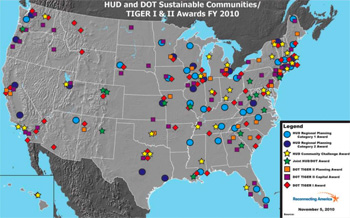Reconnecting America has crunched the numbers on which projects won planning grants from the feds last month. Planning awards were announced through three programs: Sustainable Communities Regional Planning (SCRPG), Community Challenge, and TIGER II.

It's worth noting that these are the types of competitive grant programs that John Mica is planning to put under the microscope when he takes the chair of the House Transportation and Infrastructure Committee.
"We had unelected officials sitting behind closed doors making decisions without any hearings or without any elected officials being consulted," Mica said soon after the election. "I'm going to have a full review of that."
He's looking for "rational explanations" of why the grants went to the projects they went to. Criteria for the awards were announced well in advance, but it's true that the departments could have been more transparent in their process. Reconnecting America's report can help fill in some of the gaps in the agencies' own explanations of what they were looking for when they made their decisions.
In addition to mapping the top winning regions, Reconnecting America pulled out some common themes, illustrating the awarding agencies' priorities. They include:
- Equity: ensuring equitable benefits from development with regional affordable housing plans and inclusionary zoning
- Planning for transit corridors and stations: for instance, a project in Seattle will strategize for up to 25 transit corridors and 100 new stations planned for the year 2025
- Comprehensive planning: for regions without an existing plan or for those filling in gaps on affordable housing, transportation, or sustainability
- Street connectivity and safety: complete streets, off-street trails, and making transit stations more accessible to pedestrians and cyclists
- Economic development, including workforce development
- Zoning and land use reform: fostering compact, mixed-use development
- Healthy eating: improving access to healthy food and integrating local food systems
Generally, the report reflects the growing cohesion between DOT, HUD, and the EPA and the increased desire to achieve goals systematically, instead of operating within separate silos.





